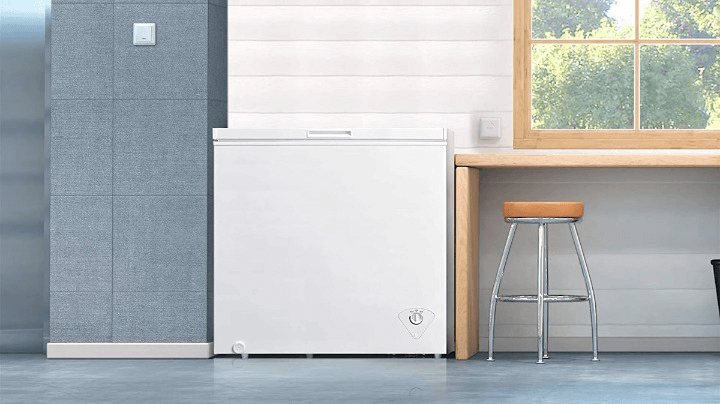Table of Contents
Does your freezer’s built-in power cord not reach the nearest outlet?
This article lists some of the best extension cords for this situation. It also breaks down exactly what factors to consider when weighing your options so that you make the best power and safety choice possible.
Can You Use an Extension Cord For a Freezer?
Yes, you can use an extension cord on a freezer. But you need to do it correctly if you don’t want to risk a fire. While extension cords should not be a permanent fixture, they are perfect for bringing power to your appliance like freezer, fridge, oven or microwave ASAP.
What To Look for in a Freezer Extension Cord?
The most important things to look for in a extension cord for freezer are the thickness (called “gauge” or “AWG”), the length, the amps, the durability, and the insulation.
Thickness
The thickness of the cord should be – for a full-size freezer – 14 gauge at a minimum, with 12 being preferable. A 14-gauge extension cord is just as good, though.
Length
For the length of the cord, the general rule is that the shorter the cord is, the less voltage drop there is, and the more efficiently the system can run. A cord with a lot of voltage drop can gradually damage the motor and cause overheating if left unchecked, among other concerns.
The Amps
It is vital to ensure that the amps/volts/watts that your freezer requires will be well within the limits of what the extension cord can do. If the amps that the refrigerator extension cord can run are close to what you require, it may be a good idea to step up to the next tier of cable so that there are no complications down the line.
Durability and Insulation
Finally, durability and insulation are essential things to consider. A cable must be coated appropriately so that the wire does not get hot and so that it is not susceptible to being damaged. Damage to the cord or overheating can create fire hazards, and you should take great care to avoid this.
How to Safely Use an Extension Power Cord for a Freezer
The use of extension power cords for freezers is something that you should only do temporarily. According to the National Electric Code and the National Fire Protection Association, extension cords should not be a permanent feature.
Ideally, the solution for powering your heavy-duty appliance is to have a new outlet installed where needed, rather than using an extension cord as a permanent connecting feature.
Using an extension cord for a heavy-duty appliance is possible, and many do so without issue. Yet, the risks it may pose, primarily if one disregards any of the parameters for safe use of the extension cord, are unnecessary and grave.
There are ways to make using your extension cord for this kind of a job a much safer affair. However, following these guidelines is an excellent way to start.
Uninterrupted Access
The cord should not run through a wall, nor should it pass through windows or doorways. These both can create many opportunities for damage to the cable. It can happen if a rat eats the cord within the wall, the door closes on the line repeatedly, or Aunt Sue trips on the cord.
Remember, severe damage to the cord can mean that it stops working in the best case and cause a fire in the worst case.
Short Cords
Cords should also be as short as they can be since this aids in the efficient use of electricity and removes extra complications. A 50-foot cord when you only need an additional 3 feet to get to the outlet is overkill and adds unnecessary voltage loss to your setup.
Three Prongs
The plugs should also all have three prongs. That third prong at the bottom is the grounding prong. This grounded extension cord prong helps keep the electrical connection safe and is a necessary component of any plug powering a heavy-duty appliance.
To remove that third prong is a dangerous idea. The same is true for using adaptors that only have two prongs. If outlets in the house only have a receptacle for two prongs, then the safest thing to do is to have the outlets upgraded by an electrician.
Check for Heating
Another critical thing to do is check the cord to see if it is heating up during use. You should check all areas. These areas include the cable itself and the ends plugged into the appliance and the wall.
If there is significant heating, this could eventually cause melting of the jacket and can pose a considerable fire risk. Overheating is a sign that the cable being used is not the right cable for the job, and you should immediately discontinue its use.
Keep Away From Flammable Materials
On the note of overheating, the extension cable itself should not be directly next to flammable materials. These materials include wooden furniture, carpets, and more.
Don’t Double-Plug
Two heavy-duty appliances should not be plugged into the same outlet, so a refrigerator and a freezer should be on different outlets. Ideally, you should plug the freezer into its own outlet to ensure that it has a power circuit to itself.
Freezers will tend to have a cycle. Sometimes, they maintain their temperature. Their motor will be actively running at other times to provide more cooling.
The electricity demands during this cooling session are more significant than during the standby phase, and you should consider this. If the refrigerator and the freezer were to go into their cooling cycle simultaneously, the demands on the system would likely be too great.
So, even though both can often be seen near each other, the outlet that each one uses should undoubtedly be kept separate.
With smaller freezers, the demands on any power circuit or extension cord will be far less. The type of extension cord required may not need to be as thick, and the freezer’s requirement for its circuit may or may not be necessary. However, you should still follow the safety guidelines about handling the extension cord.
These are not all safety guidelines, but by following these, your extension cord will be far safer and the risk of danger far lower.
Best Freezer Extension Cord
Here are a collection of the best value extension cords for you. Be sure to check the power demands made by your appliance to ensure that you are buying a cord that is appropriately rated. This step is essential, as purchasing an improperly matched cable for your freezer could result in damage to your hardware, spoiled food, or a fire – in the worst of cases.
That said, buying the right cord for your freezer will significantly decrease any risks of trouble. Ideally, any extension cords should be a temporary fixture and not a permanent means of supplying power to heavy-duty appliances.
US Wire and Cable Extension Cord
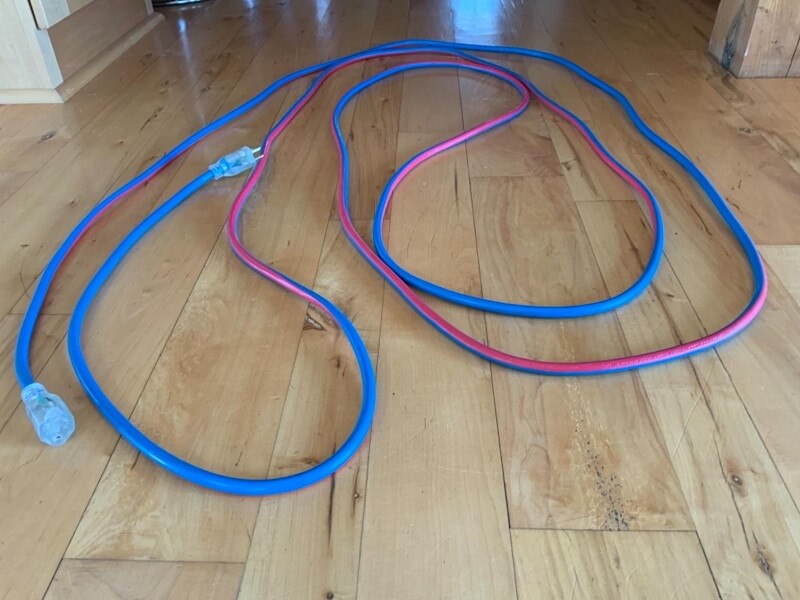
The US Wire and Cable Extension Cord is an excellent, high-quality extension cable for those looking to buy an extension cord that you can use for life. It also has a lifetime limited warranty. It comes in a few different sizes: 25 foot, 50 foot, and 100 foot.
This cable operates at 15 amps, 125 volts, and 1875 watts. It is also a 12/3 cord, which is the proper thickness of cord for powering a full-size freezer.
Yet, be careful about buying the 50-foot and 100-foot cables, as these are long enough that there will be a large amount of voltage drop. If you need an extension cord this long for your freezer, a cable thicker than 12 AWG is likely required.
The feature of the US Wire and Cable appliance extension cord that stands out is its incredible resilience in cold weather climates. It offers near-unparalleled flexibility at subzero temperatures.
Pros
- Lifetime limited warranty
- Lighted female end
- Made in the USA
- Oil-resistant jacket
- All-weather, especially good for subzero climates
- UL certified
Cons
- High price point
- Not many options in cord length
- Problematic connectors
Extension Cord for Refrigerator or Freezer
Iron Forge Cable
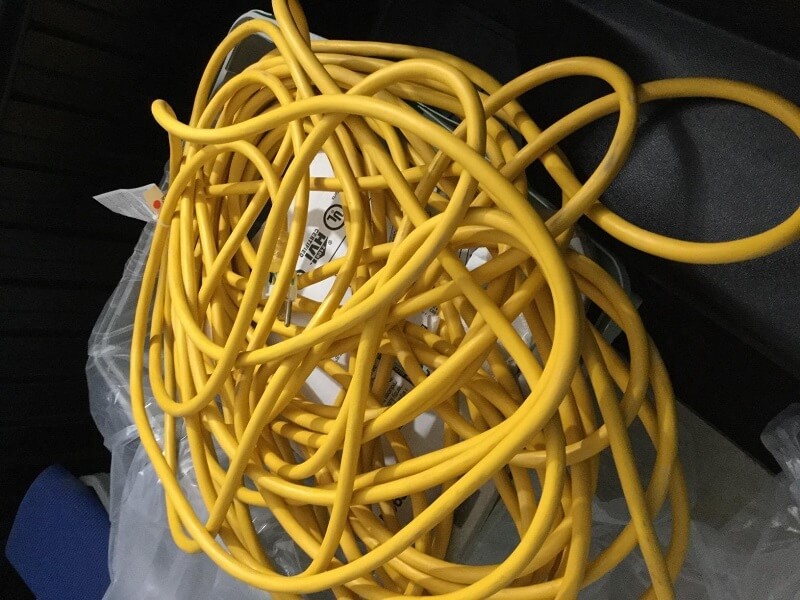
The Iron Forge cable is a 12/3 heavy-duty extension cord for a freezer or refrigerator. 12/3 means that it has three prongs. The third prong is the grounding prong, which is the feature you need to have on a cable that you will connect to a heavy-duty appliance, and the wire is a 12 gauge extension cord.
It is rated as a weather-approved, hard service, thermoplastic cable. There are many different sizes of wire, and a 12 gauge is the best blend of thickness and safety when needing to supply power to a full-size deep freezer.
You may use a thinner cable for smaller appliances with lesser power demands, but for a full-size freezer, the 12 gauge size (or thicker) is your best bet for safety. This cable is rated at 15 amps, 125 volts, and 1875 watts.
It also has a lifetime replacement warranty, which is excellent for the consumer and is designed for outdoor and indoor use.
The wire has a vast range of sizes to pick from, ranging from a 1-foot cable to a 200-foot cable! It does need to be said, though, that we would not recommend getting long cables for a freezer since using longer cables will increase the amount of power lost via resistance and needlessly increase the number of things that can go wrong with the well-being of the cable.
It is generally recommended that you buy the shortest cable that will suit your purposes. This fact is especially true for a machine that places great demands on the cable, like a full-size freezer.
Pros
- Water-resistant vinyl covering
- Lifetime warranty
- Wide range of cable sizes
- Lighted female end
- ETL certified
Cons
- Made in China, not USA-made
- Weak connectors
Extension Cord for a Chest Freezer
Stanley Extension Cord
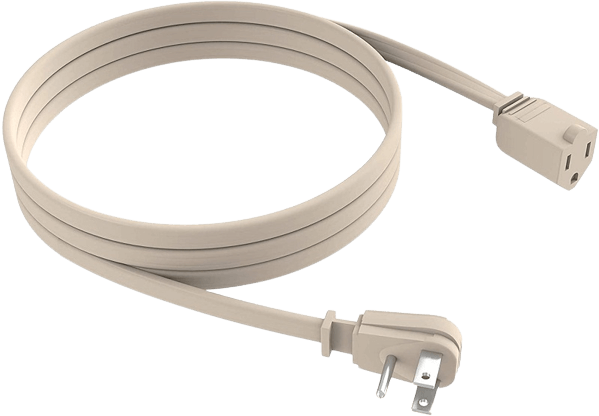
The Stanley extension cable is perfect for people who have a smaller than full size appliance, like a chest freezer. Since a smaller freezer has a much smaller power demand, the extension cable required will not need to have as thick of a gauge.
This cable is 14 AWG (one gauge size thinner than a 12 AWG cable) and boasts many of the same specs as the other cables. It can run 15 amps, 125 volts, and 1875 watts.
There is a 3-year limited warranty on the product.
It comes in many sizes, and though the range is not as wide as the Iron Forge cable’s range, it does offer 6-foot, 12-foot, and 15-foot varieties, with a separate amazon listing for 9-foot cables.
Pros
- Flat wall plug
- Lowest price point while maintaining quality
- Vinyl insulation
- 3-year limited warranty
Cons
- Thinner cable – use only with smaller freezers
- Indoor use only
- No claims about water, weather, or temperature resistance
- 14 gauge
Extension Cord For Deep Freezer
FIRMERST Heavy Duty Extension Cord
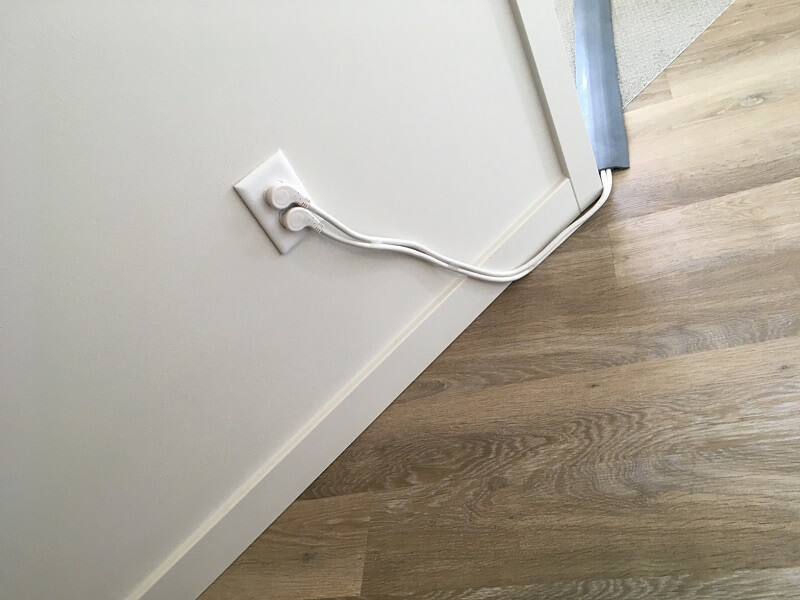
This FIRMERST cable is perfect for stronger appliances like deep freezers, it has the power and the built quality to handle it.
It’s 15 Feet long for those long range jobs. At 3×14 AWG, 15 amp, 125 volt, 1875 watts it should be able to take on a deep freezer. It is also UL&CUL listed so its safe. And the white wont jump out as some other heavy duty extension cords.
The flat plug is really practical, and over all this cable is solid. It might just be the best one on the list.
And yes, it also comes in black.
Pros
- Flat plug
- Heavy duty
- Sturdy but flexible
- UL certified
Cons
- Lack of length options
- 14 gauge
Extension Cord for a Garage Ready Freezer, Garage Ready Refrigerator
Woods Outdoor Heavy Duty All Weather Extension Cord
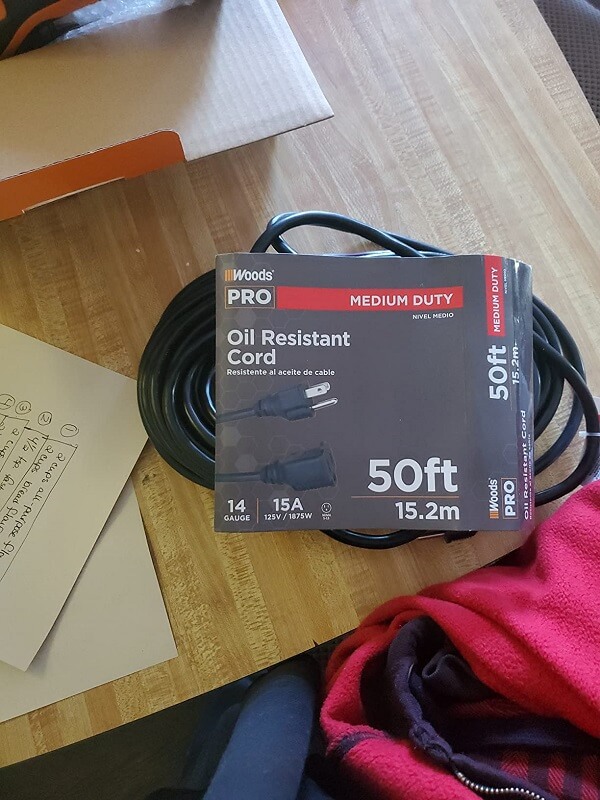
The Woods heavy duty extension cord is perfect for a garage-ready freezer. It’s made for the outdoors, but not just the outdoors it is ready for all kinds of weather meaning it can take the temperature fluctuations you might experience in a garage.
This vinyl jacket extension cable is 50 feet long. It is a 14 gauge rated at 15 amps, 125 volts, 1,875 watts. The cable is moisture, oil and even chemical resistant. It wont go stiff in cold weather, and wont break or leak because it is reinforced.
Pros
- Outdoor use
- Chemical, oil and moisture resistant vinyl jacket
- Remains flexible in a wide range of temperatures
Cons
- Pricey
- 14 gauge
FAQ
Here are some of the most frequently asked questions about extension cords for your refrigerator.
What amp extension cord do I need for a refrigerator?
Generally, a 15 amp extension cord will meet your needs. Though, for large freezers, a 20 amp may be necessary. It is always best to consult the requirements as listed for your specific appliance.
What is the difference between a garage-ready freezer and a regular freezer?
A garage-ready freezer is designed with a sturdy exterior that can handle the higher temperatures and humidity that a garage will often have. Of course, if one expects their freezer to experience high temperatures and humidity, the extension cord should also be resistant to these elements.
Can you plug a freezer into a power strip or a surge protector?
You should not plug a freezer into a power strip or a surge protector. These have built-in limits that can easily switch off without you knowing, allowing all of the food in the freezer to go bad.
Should the freezer be on a separate GFCI outlet?
Freezers should not be plugged into GFCI outlets. In the case where the outlet trips, whether there was or was not a disturbance, the food inside would all end up going bad due to the power supply being cut off.
Final Thoughts
With this knowledge, buying the right extension cord for your freezer will be much easier.
Remembering the key safety considerations when purchasing and using your extension cord will ensure that everything runs smoothly and that your freezer keeps your food at just the right temperature. Stay frosty.

